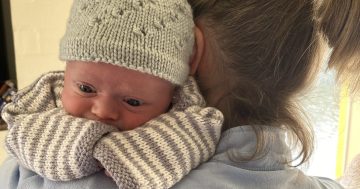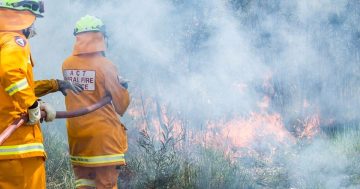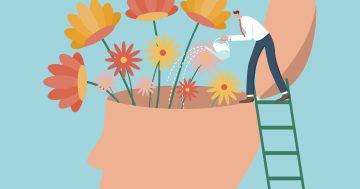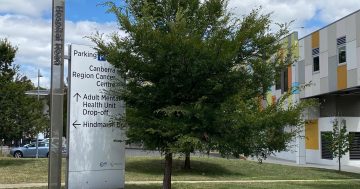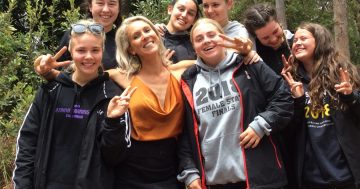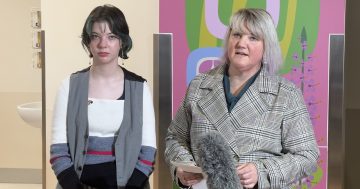
The bush below Elka Wood’s parents’ place was crackling dry just after Christmas. Photo: Elka Wood.
Since bushfires started burning around my hometown of Bega a few weeks ago I, and everyone in our community and all communities hit by fire this season, have been in and out of normal life and an impending disaster zone.
In and out. A casual afternoon dinner party could be interrupted with the call that there is active fire a few hundred metres from a friend’s parent’s place in Brogo.
This summer, there’s been a force that’s bigger than us and bigger than our plans and invitations now come with the proviso ‘weather and fires permitting’.
Tossing their smoked pork aside, all the men present are suddenly grabbing wool socks and chainsaws and running for vehicles.
In and out. A normal workday punctuated with hearing stories of suffering and loss.
I overheard someone telling the story in a shop of a man who stayed to defend and his gloves melted on his hands. I didn’t want to hear it but I did and now I can’t forget the image of that burnt man running down the road looking for help that wasn’t there.
I’ve had times of feeling buoyant and strong and really thinking I was immune to the emotional shock of being next to disaster.
I thought I could process it as a day-by-day practical issue – where is the safest place for us today? Where are my loved ones? Where are the fires? Do I need a face mask to go and buy milk today?
But the physical reality reminds me that I’m not processing this – my chest feels tight, my heart beating a little faster, my neck and shoulders like rocks and it’s harder than ever to remember to draw a deep breath.
Some days are normal. Some days, like today, it all catches up with me and I feel like my eyes are big saucers, constantly glazed with tears.
I can’t speak for those who have been directly affected by the fires – who’ve lost homes, businesses and loved ones.
I’m one of many, many people who have been next to disaster, always thinking it could be us next. Rather than a direct hit, it’s a constant, underlying anxiety that feels like it’s slowly but surely wearing down our reserves.
Perhaps there’s always a strain on our hearts and minds knowing that there is suffering in the world but I can now verify that proximity is a key factor in how strong this pull is.
Although, thanks to international media, we know that people across the world are suffering from anxiety related to Australian bushfires.
This is, on one hand, touching but it’s also a warning to consume media responsibly.
Having a day off from alerts and media is important during the fires. Trade days with family or friends so only one person is watching the fire of concern and will let others know if they need to take action.
The constancy of being packed and ready to evacuate coupled with the emotional toll of hearing stories of loss and suffering can accumulate quickly.
A friend said to me the other day: “I think it’s time for me to get some professional help, I can’t go on like this for much longer.”
Her words made me realise how important it is that no one tries to soldier through. It doesn’t matter if you haven’t lost your house or seen active fire, you probably need to talk to someone. I know I do.
Luckily, we live in a country where there is excellent access to free mental health services.
Huge concepts like the future not being safe, climate change and people and animals dying and suffering around us are not things we can incorporate into our lives and move on from.
These are things we must mourn.
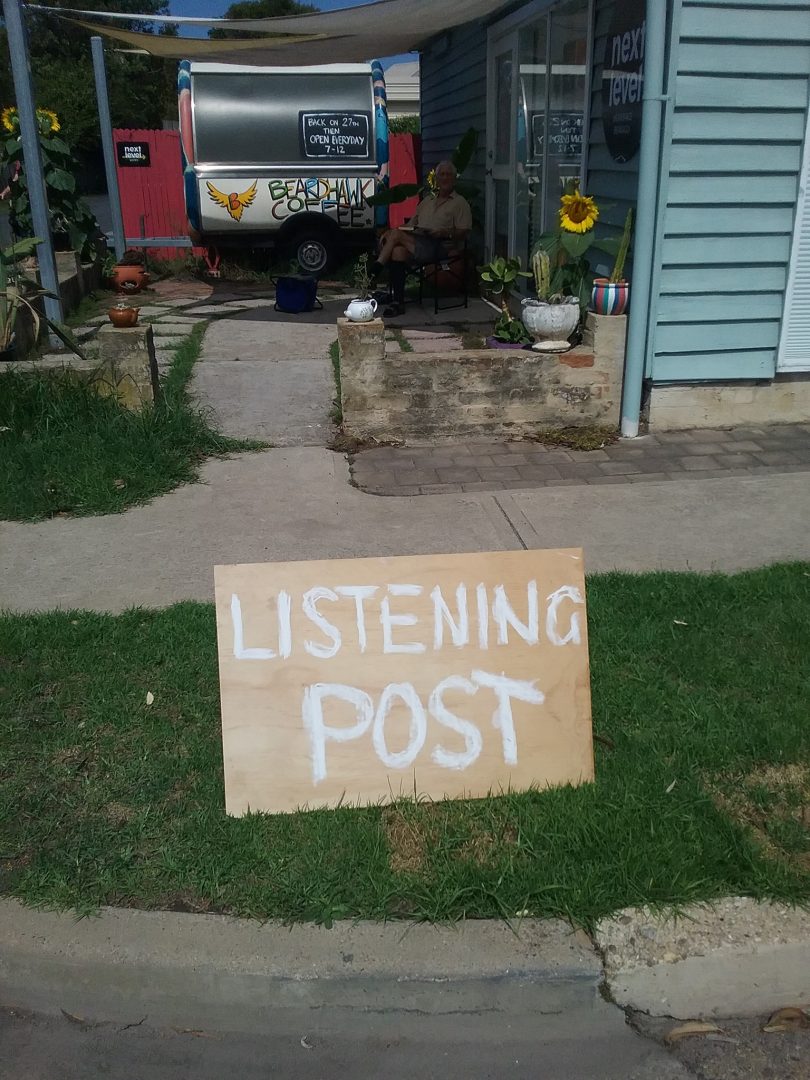
Retired counsellor David Harris of Bermagui has created a listening post for his community. Photo: Supplied.
The NSW Government has roaming mental health workers offering support in fire-affected areas.
Locally, the lovely David Harris, a retired counsellor, has been offering a free listening post outside the 777 Supermarket near the Beardhawk coffee van in Bermagui.
There are many other examples of kindness and acknowledgment of the emotional toll these fires are taking all around us. Kindness is so important now because it reminds our stress-wracked bodies that we are not in danger this instant and that we can let go.
Just for a minute.
If you’d like to access help, call Service NSW on 13 77 88 to be connected to local support services.
Medicare will cover up to 10 face-to-face or telehealth mental health treatment services for anyone in bushfire areas. You don’t need to have a diagnosed mental health condition, GP referral or mental health treatment plan and can access the sessions between 17 January 2020 and 31 December 2021.
If you live in a rural or remote area, you’ll be able to get counselling and support through video telehealth services.
The following are free services available 24 hours a day, seven days a week:
- Lifeline Australia: 13 11 14 or www.lifeline.org.au?? is a crisis support service that provides short-term support at any time for people who are having difficulty coping or staying safe.
- Beyond Blue: 1300 224 636 or www.beyondblue.org.au is available by phone or online via chat or email, to provide support on a range of mental health issues.
- MensLine Australia: 1300 78 9978 or www.mensline.org.au? is a telephone and online counselling service for men.
- Kids Helpline: 1800 551800 or www.kidshelpline.com.au? provides free, private and confidential 24/7 phone and online counselling service for young people aged 5 to 25 years.
- NSW Mental Health Line: 1800 011 511 is a mental health crisis telephone service in NSW.
If you or someone you know is in immediate danger, call Triple Zero (000) or go to your nearest hospital emergency department.
Original Article published by Elka Wood on About Regional.













